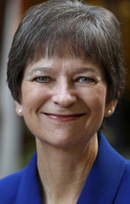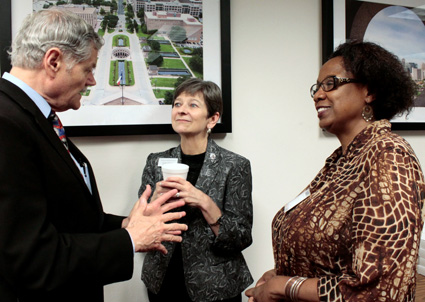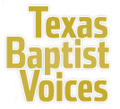Sometimes, questions have more than one answer. A friend asked why I attended the Christian Life Commission Advocacy Day at the Texas capitol. Partly, I registered because of those who encouraged me. But mostly I wanted to know what happens in Austin.
 Kathy HillmanPreviously, I had been to the capitol twice when the Legislature wasn’t in session and once for a rally when it was. My first visit was as a child. Gov. Price Daniel invited county attorneys and their families from throughout Texas to Austin. Gov. Daniel seemed 10 feet tall. I also remember being fascinated by the massive structure and captivated when the guide explained state government on my first-grade level. Somehow, I got its importance. Then, while Daddy went to meetings, we climbed statues and played on the grassy grounds.
Kathy HillmanPreviously, I had been to the capitol twice when the Legislature wasn’t in session and once for a rally when it was. My first visit was as a child. Gov. Price Daniel invited county attorneys and their families from throughout Texas to Austin. Gov. Daniel seemed 10 feet tall. I also remember being fascinated by the massive structure and captivated when the guide explained state government on my first-grade level. Somehow, I got its importance. Then, while Daddy went to meetings, we climbed statues and played on the grassy grounds.
My second visit came when our daughter Holly took the course on teaching elementary social studies at Howard Payne University. The class planned and simulated a field trip to the capitol and invited “children” to participate. I dutifully traveled to Austin, played my role and learned more about Texas government.
 The “Rally for Texas Libraries” in 2011. (Photo: Kathy Hillman)In 2011, the Texas Library Association met in Austin just as the Legislature significantly cut education funding, and many school librarians lost their jobs. Several thousand of us showed up to “Rally for Texas Libraries” on the capitol grounds. Our support seemed to have little impact, so when I signed up for the CLC’s Advocacy Day, I wondered if advocacy matters at all.
The “Rally for Texas Libraries” in 2011. (Photo: Kathy Hillman)In 2011, the Texas Library Association met in Austin just as the Legislature significantly cut education funding, and many school librarians lost their jobs. Several thousand of us showed up to “Rally for Texas Libraries” on the capitol grounds. Our support seemed to have little impact, so when I signed up for the CLC’s Advocacy Day, I wondered if advocacy matters at all.
The event began as Kathryn Freeman, director of public policy, offered a crash course in communicating with legislators:
• Be Accurate. Check facts.
• Be Brief. If possible, address a single issue, and choose information carefully.
• Be Courteous and respectful. Build relationships. Engage in two-way communication. Send a follow-up thank-you. When I later asked a legislative staffer the most difficult part of her job, she answered it’s remaining courteous during calls from less-than-kind constituents, which she noted have increased in recent years.
 Kathy Hillman meeting with Rep. Gary VanDeaver. (Photo: Jordan Corona/CLC)
Kathy Hillman meeting with Rep. Gary VanDeaver. (Photo: Jordan Corona/CLC)
Sign up for our weekly edition and get all our headlines in your inbox on Thursdays
Following a briefing on policy issues such as payday lending, immigration reform and public education, Freeman patiently explained how hearings work and how to register support or dissent. She encouraged us to visit our legislators’ offices to explain our positions and invite them to a reception that afternoon. Even if the official wasn’t present, she suggested talking with their assistants.
Three of us hailed from Waco, so we trooped to the capitol together. Since neither the Senate nor House had adjourned, we talked with the staffs of Sen. Brian Birdwell and Rep. “Doc” Anderson and left our invitations.
Later, legislators joined us at the reception. Getting to know them on a personal level highlighted my day. Several who stopped by were Baptists or had Baptist connections, including freshman Rep. Gary VanDeaver, who recently retired as superintendent of New Boston schools and understandably strongly supports public education.
 Sarah Byers (right) is a Baylor University junior working with Sen. Kirk Watson through the university’s Bob Bullock Scholars Internship Program. (Photo: Kathy Hillman)Some encouraged staff members to attend. I was thrilled when my representative brought his entire staff. Austin Sen. Kirk Watson sent Sarah Byers, a Baylor University junior working with him through the university’s Bob Bullock Scholars Internship Program. I was proud to see one of our Texas Baptist students involved in state government.
Sarah Byers (right) is a Baylor University junior working with Sen. Kirk Watson through the university’s Bob Bullock Scholars Internship Program. (Photo: Kathy Hillman)Some encouraged staff members to attend. I was thrilled when my representative brought his entire staff. Austin Sen. Kirk Watson sent Sarah Byers, a Baylor University junior working with him through the university’s Bob Bullock Scholars Internship Program. I was proud to see one of our Texas Baptist students involved in state government.
But did I learn what happens in Austin? Thanks to Executive Director Gus Reyes and the CLC team, we saw a snapshot of Texas government, and I discovered several truths.
Advocacy isn’t about politics. It’s about people and policies. Incremental progress still is progress.
 Waco Rep. Charles “Doc” Anderson talks with Kathy Hillman and Evelyn Ofong. (Photo: Jordan Corona/CLC)Because fewer citizens advocate than vote, we can have significant impact with our voices. As Evelyn Ofong and I stood with our Waco representative outside the reception, Dr. Anderson pointed out a woman with a service dog. Earlier, he heard her testify concerning the necessity of keeping services to the blind consolidated. He explained she had traveled with great difficulty to Austin because she is blind and her son has multiple disabilities. She made a difference in his eyes.
Waco Rep. Charles “Doc” Anderson talks with Kathy Hillman and Evelyn Ofong. (Photo: Jordan Corona/CLC)Because fewer citizens advocate than vote, we can have significant impact with our voices. As Evelyn Ofong and I stood with our Waco representative outside the reception, Dr. Anderson pointed out a woman with a service dog. Earlier, he heard her testify concerning the necessity of keeping services to the blind consolidated. He explained she had traveled with great difficulty to Austin because she is blind and her son has multiple disabilities. She made a difference in his eyes.
As advocates, we, too, can make a difference as admonished in Proverbs 31:8-9: “Speak up for those who cannot speak for themselves, for the rights of all who are destitute. Speak up and judge fairly; defend the rights of the poor and needy.”
 After all, what happens in Austin doesn’t stay in Austin. It affects you and me and everyone in Texas every day.
After all, what happens in Austin doesn’t stay in Austin. It affects you and me and everyone in Texas every day.
Kathy Hillman is president of the Baptist General Convention of Texas. She also is director of Baptist collections, library advancement and the Keston Center for Religion, Politics and Society at Baylor University.
















We seek to connect God’s story and God’s people around the world. To learn more about God’s story, click here.
Send comments and feedback to Eric Black, our editor. For comments to be published, please specify “letter to the editor.” Maximum length for publication is 300 words.